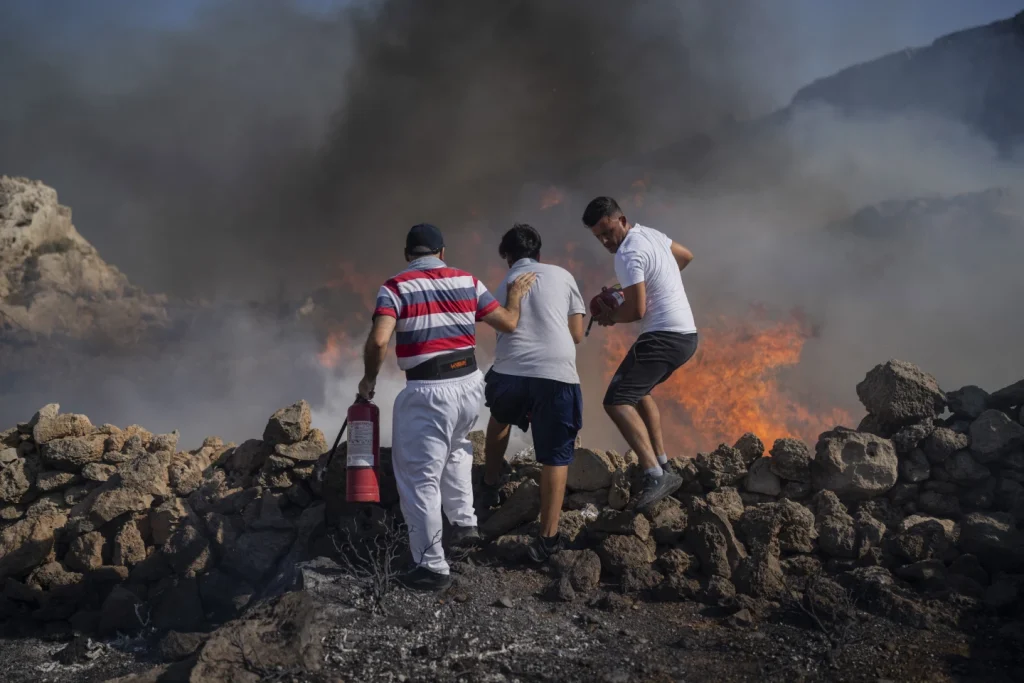In the picturesque coastal town of Rhodes, Greece, a heartwarming display of solidarity unfolded amidst the chaos and danger of raging wildfires that have plagued Mediterranean regions during recent scorching heat waves.
Tourists, who had sought respite at a seaside hotel on the idyllic Greek island, sprang into action, grabbing pails filled with pool water and damp towels, determined to assist the hotel staff and local residents in extinguishing the encroaching flames.
Their swift and coordinated efforts proved instrumental in containing the fire, resulting in a situation where, by the time the fire brigade arrived, the majority of the blaze had already been dealt with.
Elena Korosteleva, a vacationer from Britain who had been staying at the Lindos Memories hotel, attested to the remarkable teamwork that unfolded before her eyes.
The following day, while some guests chose to curtail their holidays due to the unsettling events, the majority decided to stay on, reassured by the fact that the resort had remained unscathed by the small brush fire that had ignited just outside its grounds.

The picturesque Greek island of Rhodes, renowned for its breathtaking beaches and rich ancient sites, finds itself in a state of recovery following the harrowing ordeal of 11 days of relentless wildfires that ravaged the land in the month of July.
As the flames engulfed vast stretches of the island, thousands of residents and tourists were forced to evacuate, disrupting what is typically the peak of the travel season.
Now, amidst the smoldering ashes and charred landscapes, Rhodes grapples with the profound implications this crisis will have on its vital tourism sector, a cornerstone of its economy and a significant contributor to Greece’s overall financial stability, accounting for approximately 20% of the country’s revenue.
The scorching heat waves and devastating wildfires wreaking havoc across the Mediterranean region are not sparing other popular tourist destinations like Italy and Spain.
In these countries as well, the tourism sector is feeling the weight of these natural disasters.
According to estimates from the European Union, Greece, Italy, Algeria, and Tunisia combined suffered a loss of over 1,350 square kilometers (520 square miles) of land to wildfires, affecting the lives of around 120,000 people.
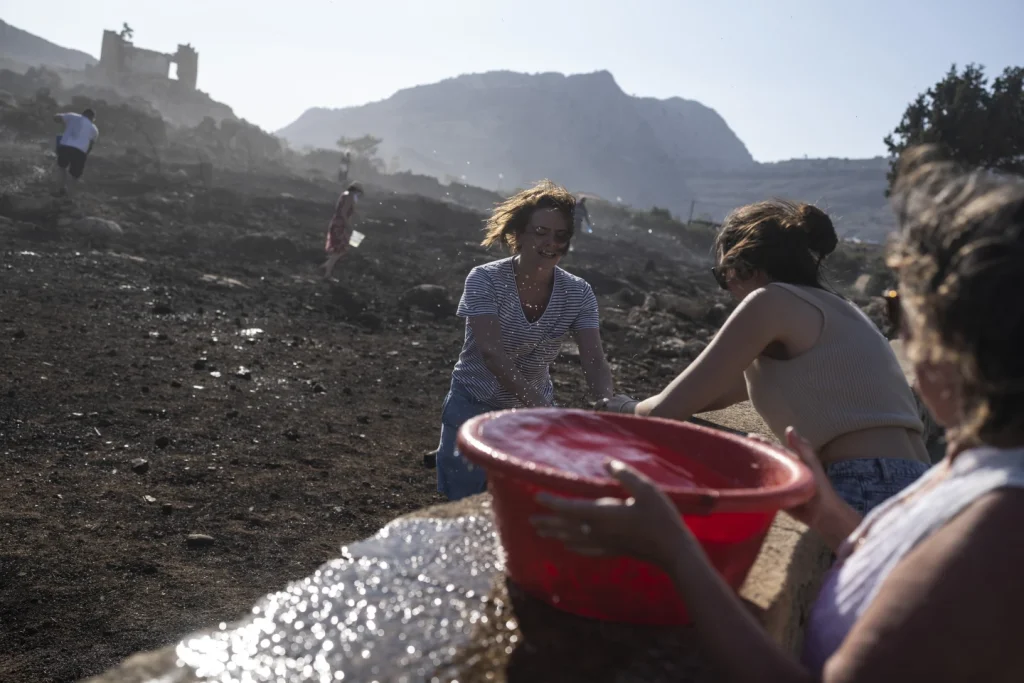
Unfortunately, the situation is expected to worsen in Greece with the arrival of even more extreme heat in the upcoming days.
In Villardeciervos village, located in a region of northwestern Spain that was devastated by fires last summer, the mayor, Rosa María López, expressed concerns about the impact on tourism.
She believes that the tourism industry will inevitably face some challenges in the coming years, whether they like it or not.
The once lush hiking trails in the area have been stripped of their trees, a sight that brings great sadness. However, despite these difficulties, this region continues to be highly valued by tourists.
The capacity to adapt and find new ways to attract visitors will be crucial in mitigating the negative effects of the fires.
The fires have already caused a decline in tourism in heavily affected parts of Greece and Italy. Rhodes, a popular Greek island, experienced a significant number of flight cancellations, and a similar trend has been observed in Sicily, according to Olivier Ponti, the Vice President of Insights at ForwardKeys, a travel data company that has access to airline industry ticketing data.
The impact of these fires can be seen in the reluctance of tourists to visit regions that have been severely affected, despite their historical significance and natural beauty.
As the tourism sector in Mediterranean countries continues to grapple with the consequences of heat waves and wildfires, the challenges faced by these destinations are becoming increasingly evident.
The loss of vegetation, the destruction of natural habitats, and the negative image associated with the fires are all contributing factors.
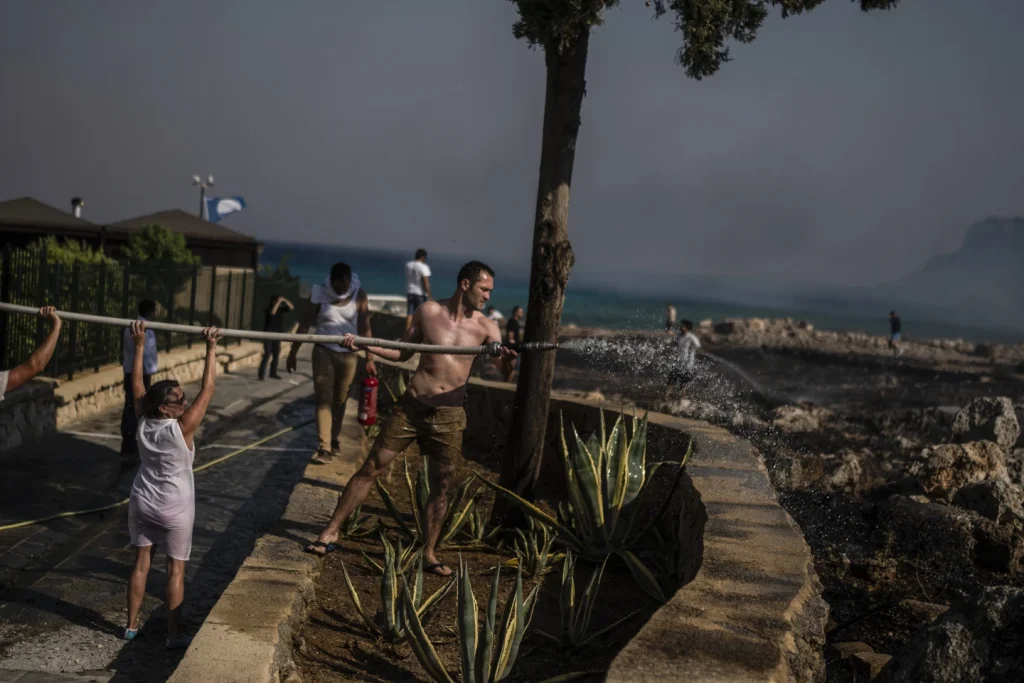
However, it is essential for these regions to recognize their enduring appeal to tourists and take action to adapt their offerings.
Through innovative initiatives and environmental preservation efforts, Mediterranean countries can mitigate the damage caused by these natural disasters and accelerate the recovery of their tourism sectors.
The impact of wildfires and climate change on travel destinations has become a growing concern in recent years.
While Greece has managed to avoid significant damage to its tourism industry, Italy has not been as fortunate.
Even destinations that are not directly affected by the fires have experienced a slowdown in bookings, with Rome witnessing a drop in the last week of July.
However, it is not just wildfires that pose a threat to tourism. The intensifying summer heat, exacerbated by climate change, has become a deterrent for travelers.
In southeastern Spain’s coastal resort city of Benidorm, a popular destination for British and Scandinavian tourists, hoteliers are growing increasingly worried.
Antonio Mayor, the chair of the hotel and tourism association in the Valencia region, which includes Benidorm, expressed concerns about the impact of heat waves on the local economy.
He emphasized that if such extreme weather events were to occur every summer, the consequences would be significant.
As a result, tourists might opt to head north to Scandinavian countries or the United Kingdom instead. The potential shift in tourist preferences highlights the need for destinations to adapt to the changing climate and find sustainable solutions to mitigate its impact on the tourism industry.
According to Tim Hentschel, the CEO of digital booking platform HotelPlanner, the scorching temperatures experienced in European countries such as Greece, Italy, and Spain are not expected to subside as we transition into the month of August.
Given this forecast, it may be deemed a considerably safer choice to opt for a vacation in northern Europe. The World Meteorological Organization and the EU’s Copernicus Climate Change Service have jointly determined that July has been the hottest month on record.
This alarming statistic serves as a harbinger of the changes that lie ahead as our planet continues to warm, warn scientists.
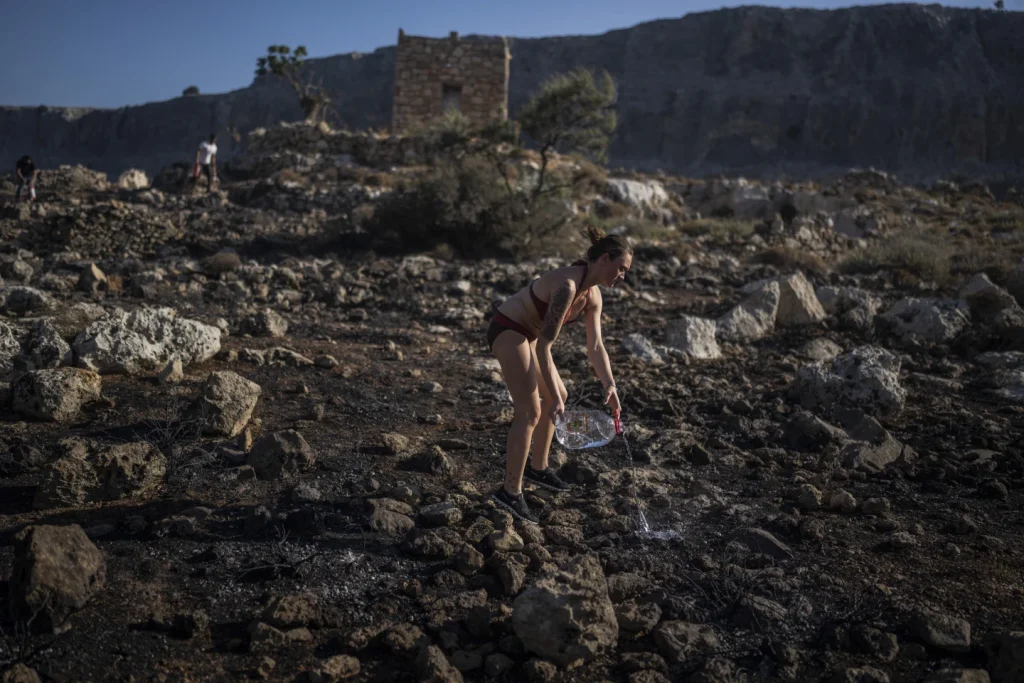
These changes include an increased likelihood of flooding, longer-lasting and more intense wildfires, and extreme weather events that pose a significant threat to human lives.
In light of these potential risks, Sensible Weather, a climate technology startup based in the United States, is currently in the process of developing insurance coverage that would provide compensation to individuals whose holidays are adversely affected by extreme heat.
Sensible Weather, a prominent weather insurance provider, has recently introduced its innovative “weather guarantee” coverage to travel companies in the United Kingdom, France, and the United States.
This groundbreaking coverage aims to compensate travelers in the unfortunate event that their beach vacation is marred by prolonged rain or if there is a lack of snow for their eagerly awaited ski trip.
The company’s founder, Nick Cavanaugh, has also revealed plans to add a heat cover option to their offerings, in anticipation of the upcoming summer season.
Cavanaugh explains that the increasing interest in this new option is a result of people becoming more aware and concerned about the potential impact of weather conditions on their travel plans.
Sensible Weather’s commitment to providing comprehensive and tailored coverage reflects their dedication to addressing the evolving needs and preferences of travelers worldwide.
Sensible Weather, a well-known provider of weather insurance, has recently unveiled its revolutionary “weather guarantee” coverage to travel companies operating in the United Kingdom, France, and the United States.
This groundbreaking insurance aims to provide compensation to travelers in the unfortunate event that their beach vacation is ruined by extended periods of rain or if there is a lack of snow for their highly anticipated ski trip.
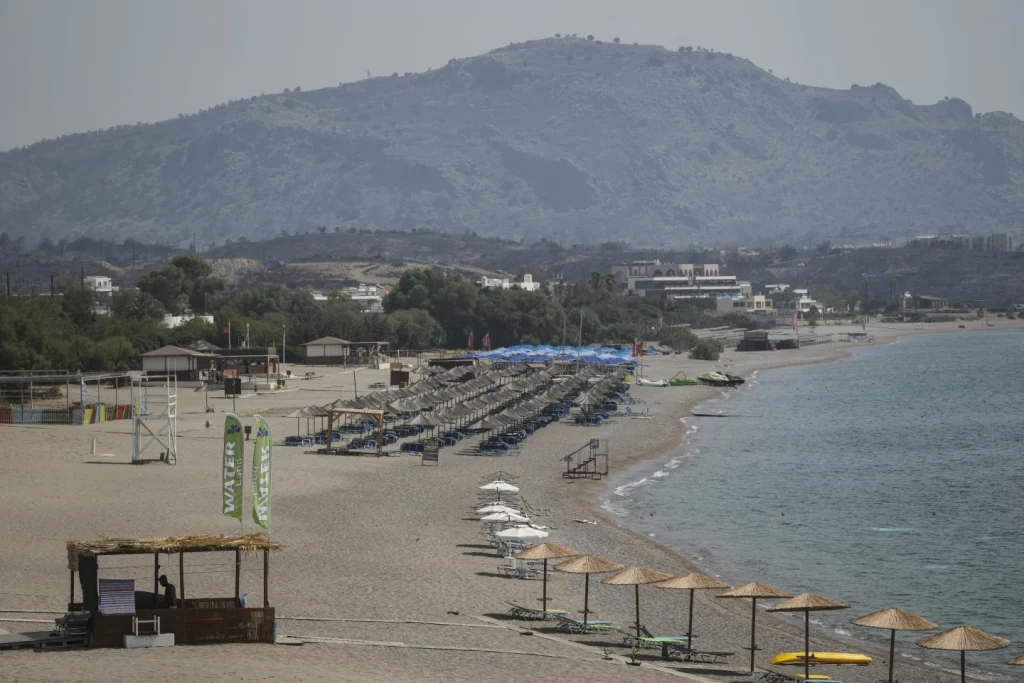
In addition to this innovative coverage, the company’s founder, Nick Cavanaugh, has revealed plans to introduce a heat cover option in preparation for the upcoming summer season.
Cavanaugh explains that the growing interest in this new option is a direct result of people becoming increasingly aware and concerned about the potential impact of weather conditions on their travel plans.
Sensible Weather’s commitment to offering comprehensive and customized coverage underscores their unwavering dedication to addressing the ever-evolving needs and preferences of travelers worldwide.
Manolis Markopoulos, the esteemed head of the Rhodes hotel association, exudes a sense of unwavering optimism as he contemplates the future of tourism on the island.
Despite the devastating impact of the recent flames, Markopoulos firmly believes that the rebounding arrivals to the unaffected parts of Rhodes can salvage a significant portion of the projected boost in tourism.
With each passing day, he witnesses a steady increase in business, fostering a glimmer of hope for the island’s battered economy.
Markopoulos confidently predicts that by the dates of August 8th to 10th, normalcy will be restored at all the resorts, which collectively account for a staggering 90% of the island’s 220,000 beds.
However, Markopoulos acknowledges that the road to recovery for the damaged areas will be more arduous.
Nonetheless, he commends the courage of certain tour operators who have already made the bold decision to bring customers to these areas starting from the upcoming weekend.
Although these regions have a longer journey ahead before they can fully regain their former glory, Markopoulos reassures that they represent a mere fraction, not even 10%, of the island’s total capacity.
Thus, while challenges lie ahead, the overwhelming majority of Rhodes remains resilient and poised to reclaim its status as a thriving tourist destination.
The recent wildfires in Rhodes have had a significant impact on new bookings for future travel to the region.
According to Ponti, bookings for Rhodes plummeted by 76% during the week of July 17, coinciding with the start of the fires, compared to the previous week.
The decline in bookings extended beyond Rhodes, affecting Greece as a whole, with a slump of 10%, as reported by Ponti.
In response to the fires, some major British operators temporarily canceled all flights and holidays to Rhodes, offering refunds to those who had made bookings for the affected areas.
However, other budget airlines continued to operate flights and reported normal travel figures, as noted by Hentschel from HotelPlanner.
In Germany, TUI, a leading travel operator, has resumed offering vacations to all parts of Rhodes after temporarily ceasing to fly tourists in.
In light of the recent forest fires that have ravaged the beautiful island of Rhodes, the CEO of TUI, Sebastian Ebel, has emphasized the importance of continuing tourism in order to not further harm the local population.
Ebel, in an interview with Germany’s dpa news agency, expressed his concern that a decline in tourist numbers would have detrimental effects on the livelihoods of the people of Rhodes.
Acknowledging the significance of tourism as a major source of income for the island, Ebel’s statement highlights the delicate balance between supporting the local economy and addressing the environmental challenges faced by Rhodes.
In a similar vein, Greek Prime Minister Kyriakos Mitsotakis has made efforts to reassure potential visitors by offering an additional incentive.
During an appearance on ITV’s “Good Morning Britain,” Mitsotakis pledged to provide those whose vacations were disrupted by the fires with a free week on the island in either the upcoming spring or fall seasons.
This gesture not only aims to compensate affected tourists but also demonstrates the Greek government’s commitment to revitalizing the tourism industry in Rhodes.
By combining the efforts of both the private and public sectors, it is hoped that the island can recover from the devastating fires and continue to thrive as a popular tourist destination.
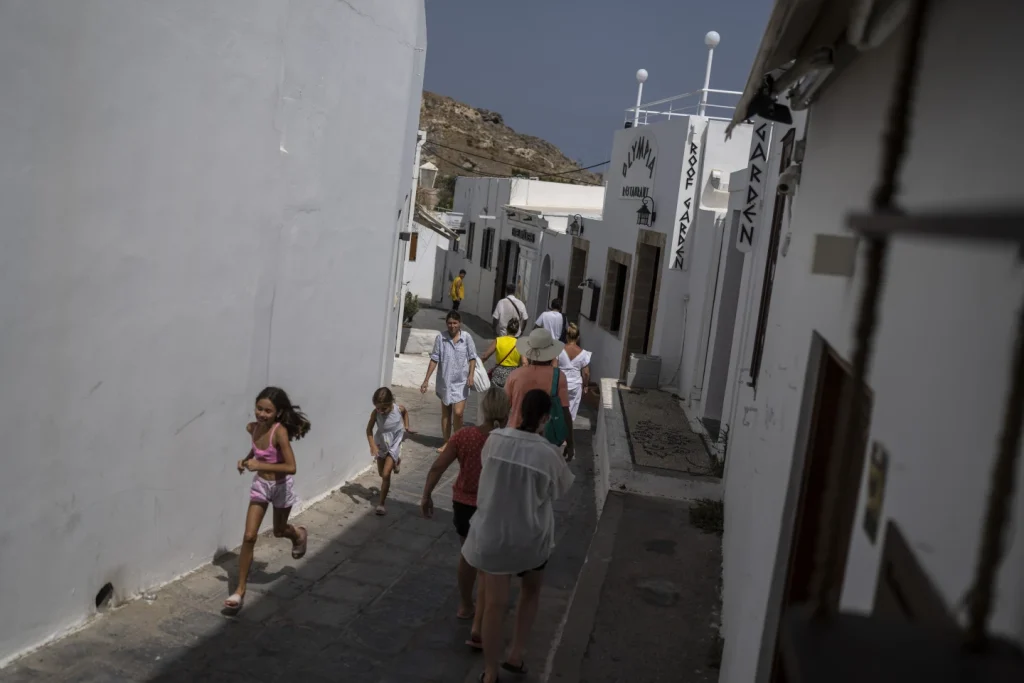
In light of the recent devastating wildfires that have engulfed the picturesque island of Rhodes, Elena Korosteleva, a vacationer on the island, emphasizes the urgent need for action against climate change.
As the flames continue to ravage the land, Korosteleva, who is also the head of the University of Warwick’s Institute of Global Sustainable Development, believes that these catastrophic events serve as a wake-up call for humanity.
They highlight the profound impact that our actions have had on the planet and the potential irreversibility of these changes.
It is crucial to recognize that the issue at hand extends far beyond the realm of tourism; it is a pressing matter that demands immediate attention and action from individuals, communities, and governments worldwide.
The urgency to address climate change has never been more apparent, and it is imperative that we heed this call and take decisive steps towards a more sustainable and resilient future.
